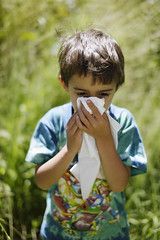Stuffy Nose or Sinus Problems? Here's a Fix

Thirty-six million Americans have chronic sinus troubles. Millions more-perhaps 1 in 7 people-suffer from rhinitis, a fancy name for stuffy nose. They may now benefit from the new research conducted by Melissa Pynnonen and her colleagues at the University of Michigan.
The researchers tested saline nose sprays and saline rinses in 121 adults, all of whom had stuffiness, sinus pain, and other chronic nasal and sinus symptoms. All reported fewer symptoms after eight weeks of treatment with either saline nose spray or a twice-daily rinse with 8 ounces of salt water, using a plastic squeeze bottle. But the nasal rinse group showed far greater improvement in severity and frequency of symptoms, with 40 percent of the rinse group saying they still had symptoms often or always, compared with 61 percent of the spray group.
Otolaryngologists and allergists say they've known for decades that saline rinses help, and they often recommend them, particularly for people with sinus infections or who have had sinus surgery. Recent research, including a July 2007 analysis by the Cochrane Review, finds consistent benefits. Indeed, the whole idea of nose washing as good hygiene is thousands of years old. Indian neti pots have been sold for years in health-food stores, and drugstores now stock an assortment of saline sprays and squeeze bottles.
The allergists and ENTs agree that people aren't as aware of the virtues of saline rinses as they should be. Doctors often forget to mention it, says Brad Marple, a professor and vice chairman of the department of otolaryngology at the University of Texas Southwestern Medical Center in Dallas. It doesn't have the glamour and panache of surgery or many of the pharmaceutical products, Marple says. There isn't a company that's making a huge amount of money off of salt water. But the bottom line is, you'd be hard pressed to find people who don't benefit. Not only can patients reduce the need for antibiotics or surgery, he says, but it's one of the rare medical treatments where patients are in control.
Nose washing can be a do-it-yourself affair. Here's Pynnonen's home recipe:
- ¼ teaspoon of kosher salt (kosher salt has no iodine or other additives)
- ¼ teaspoon of baking soda (to buffer the solution and make it less irritating)
- 8 ounces of water
Mix and squirt gently in each nostril with a squeeze bottle.
Drugstores stock squeeze bottles designed for nasal rinsing; brand names include NeilMed, Grossan, and Ayr. These companies also sell premeasured saline packets, which are particularly handy for traveling. Some doctors recommend using distilled water or boiling the water first and letting it cool, particularly if the home water supply comes from a well that may have bacteria. The squirt bottles need to be washed periodically with hot soapy water and should be replaced as often as you replace your toothbrush, Pynnonen says, because bacteria gradually build up in them. There's a lot of debate on Internet sites on what saline solution works best, hypertonic (more salt) or hypotonic (less salt). The studies conflict on that point, and Pynnonen thinks it doesn't really matter. The take-home point: A well-washed nose is a happier, healthier nose.





















